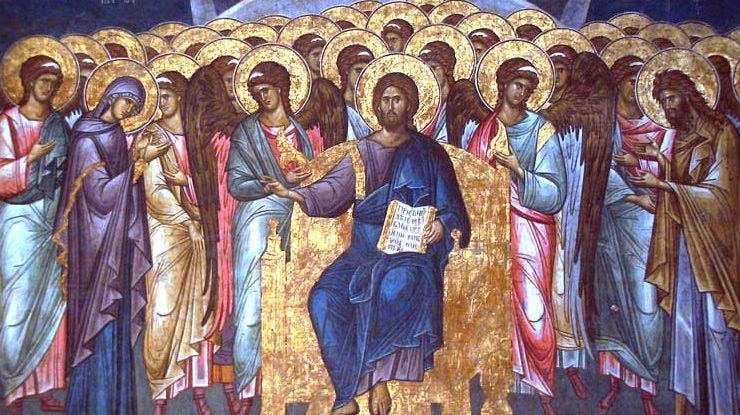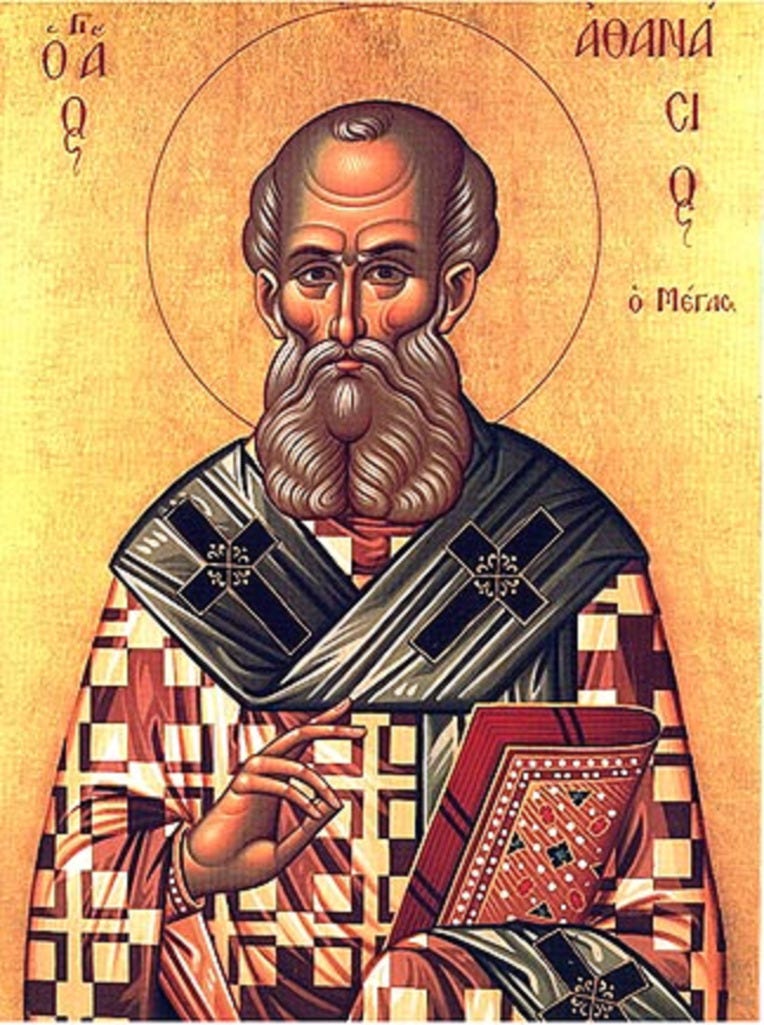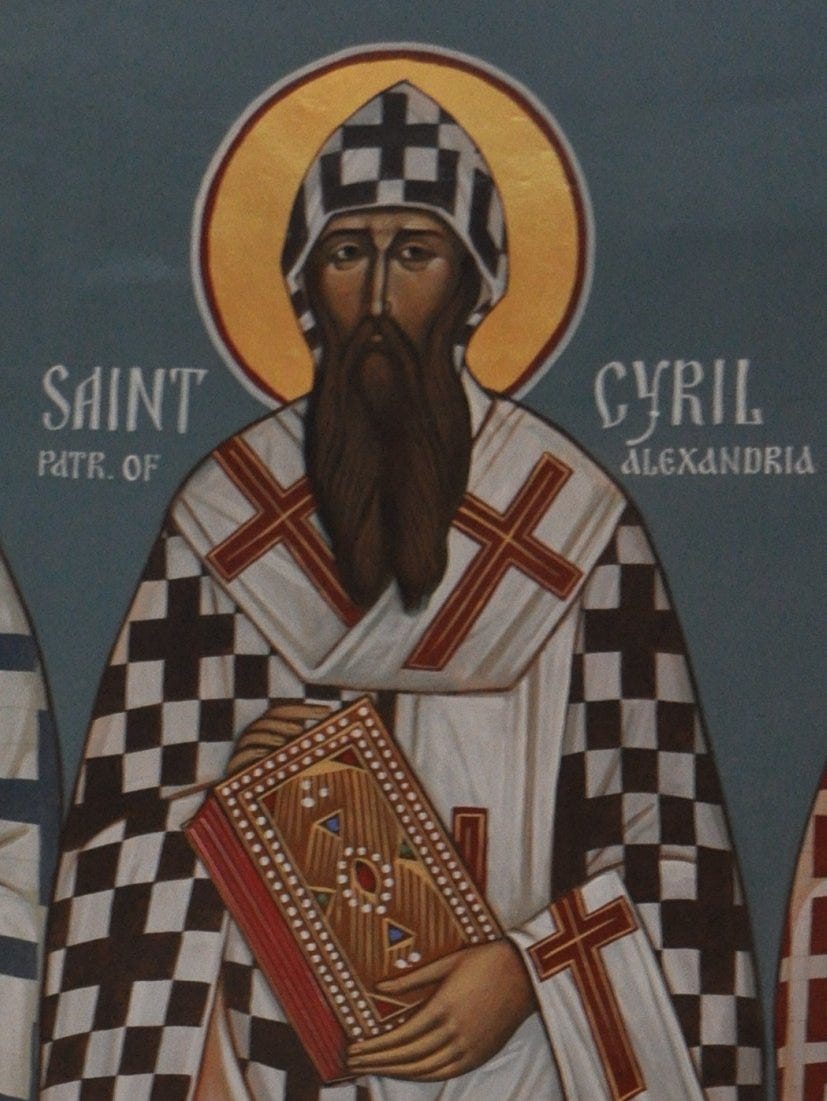2 Peter 1:3 His divine power has granted to us all things that pertain to life and godliness, through the knowledge of him who called us to his own glory and excellence, 4 by which he has granted to us his precious and very great promises, so that through them you may become partakers of the divine nature.
It was brought to my attention after last week’s podcast episode that some of you might be stuck at the mention of the concept of theosis. Theosis refers to the divinization of human beings at the resurrection from the dead. To help get us unstuck, I will spend the majority of this article allowing the church to do the talking for me.
First let’s cite Athanasius I of Alexandria (c. 296–298 – 2 May 373). “He was also called Athanasius the Great, Athanasius the Confessor, or, among Coptic Christians, Athanasius the Apostolic, was a church father and the 20th pope of Alexandria (as Athanasius I). His intermittent episcopacy spanned 45 years (c. 8 June 328 – 2 May 373), of which over 17 encompassed five exiles, when he was replaced on the order of four different Roman emperors. Athanasius was a Christian theologian, a Church Father, the chief defender of Trinitarianism against Arianism, and a noted Egyptian Christian leader of the fourth century.” 1
This is a sample of his teaching on the topic:
“He (Jesus) was made man that we might be made God”. “He was not, therefore, first man and then God, but first God and then man, in order that He might rather deify us”. 2
Now here is an excerpt from the Episcopal Church’s website on the topic:
“Theosis, a term used in the tradition of Orthodox theology to refer to the participation of the human person in the life of God. It is also known as deification or divinization. It means “being made God” and reflects the dominant Orthodox understanding of salvation in Christ. Athanasius urged that God became man so that we might become divine. Humanity and God are understood to be infinitely distant from each other, but finite humanity and the infinite God are fully joined in Christ. As stated by Cyril of Alexandria, “We are made partakers of the divine nature and are said to be sons of God. . . not only because we are exalted by grace to supernatural glory, but also because we have God dwelling in us.” The saving benefit of theosis is rooted in the Incarnation and the activity of divine grace. The active presence of the Holy Spirit brings us into communion with God. A central image for theosis is Christ’s transfiguration (Mk 9:2-8 and parallels). Theosis is associated with the gift of divine glory (Jn 17:5, 22-24), adoption as children of God by the indwelling Spirit (Rom 8), and participation in the divine nature (2 Pt 1:4).” Although theosis has not been emphasized in Anglican theology of salvation, it is compatible with William Porcher DuBose’s understanding of humanity’s destined union with God through the saving process of divine grace.3
In Weslyan theology we typically use the term “glorification” or “glorifying grace” to refer to what amounts to the same outcome as the early church’s understanding of theosis. Here is a link to John Wesley’s sermon on the resurrection from the dead to see how he describes what this outcome might look like based on certain episodes of scripture.
Now, I get what is throwing people off who have been raised in the West under the very bold and effective messaging of pietistic, puritanical, let’s be honest, Baptisty/Reformed types of influences. There has been a persistent and heavy emphasis on sin and being saved from sin. The people of the various Wesleyan traditions have for the most part functioned to get sucked into the vortex of this messaging (mainly because of our, let’s be honest, wimpy messaging). Most people find this to be the be all and end all of Christianity. But it just isn’t.
The Eastern church, however, probably retains more of an apostolic understanding of salvation with it’s emphasis on, not what we are saved from, but what we are saved for. In the Eastern church, the focus of their teaching of salvation is on the goal of redemption, which is theosis, or complete union with God.
Here is another excerpt from Cyril of Alexandria (c. 376 – 444):
“The Holy Spirit works in us by himself, truly sanctifying us and joining us to himself; and by this coalescence and union of ourselves with him he makes us sharers in the diving nature . . . beautifying human nature with the splendour of the divinity” (Oden p. 208)
What is throwing people off is the idea of people becoming gods. I get it. But what word would you prefer for us to use?
People don’t become angels, but scripture teaches us that some believers will be elevated to a higher status than angels:
1 Corinthians 6:2 Or do you not know that the saints will judge the world? And if the world is to be judged by you, are you incompetent to try trivial cases? 3 Do you not know that we are to judge angels?
And when we talk about angels, keep in mind that in the Book of Revelation none other than the Apostle John himself couldn’t resist the urge to worship one of these beings before getting rebuked for it by the angel.
Revelation 22:8 I, John, am the one who heard and saw these things. And when I heard and saw them, I fell down to worship at the feet of the angel who showed them to me, 9 but he said to me, “You must not do that! I am a fellow servant with you and your brothers the prophets, and with those who keep the words of this book. Worship God.”
John Wesley affirms this understanding of scripture related to being elevated to the status of angels in his sermon “The General Deliverance”:
“May I be permitted to mention here a conjecture concerning the brute creation What, if it should then please the all-wise, the all-gracious Creator to raise them higher in the scale of beings What, if it should please him, when he makes us "equal to angels," to make them what we are now, -- creatures capable of God; capable of knowing and loving and enjoying the Author of their being If it should be so, ought our eye to be evil because he is good However this be, he will certainly do what will be most for his own glory.
If it be objected to all this, (as very probably it will,) "But of what use will those creatures be in that future state" I answer this by another question, What use are they of now If there be (as has commonly been supposed) eight thousand species of insects, who is able to inform us of what use seven thousand of them are If there are four thousand species of fishes, who can tell us of what use are more than three thousand of them If there are six hundred sorts of birds, who can tell of what use five hundred of those species are If there be four hundred sorts of beasts, to what use do three hundred of them serve Consider this; consider how little we know of even the present designs of God; and then you will not wonder that we know still less of what he designs to do in the new heavens and the new earth.”
Now given all of this, let’s be clear. There is only one uncreated being who possesses the qualities of omnipotence, omniscience, and omnipresence. Neither glorified human beings, nor any other beings will ever possess those qualities. Only one being is infinite in nature. These qualities cannot be transferred to created beings. But many other qualities can be transferred and received by God’s creatures.
It is that receiving part that is the important part of the equation. That is the work of what we typically call sanctification. Little by little, over time, through faithful and diligent discipleship that will normally only occur by participation in the gathered body of Christ we are being made fit to become fully joined to God.
You see, if you are working from a theology that emphasizes sin, with the work of the cross being only about saving us from the wrath of God as a consequence of human sin, then once you’re saved it’s too tempting to think we’re just kind of waiting around twiddling our thumbs waiting for heaven (whatever that means). Can you see how church kind of becomes optional once that particular work is done? And church kind of gets boring and repetitive when the only job is just trying to get people out of hell and into heaven and then mission completed.
This is where the old boy starts thinking, “well I’m already saved and I guess it’s the preachers job to get everyone else saved . . . so it won’t hurt anything if I go play golf on Sunday morning.” “And I’ll just drank two beers and that’ll be it, and that’ll be ok. Well maybe three but not all at once, and that makes me a good Christian.” And then, “you know I don’t really need the church to be saved and go to heaven I can just worship God out in nature or doing yard work or wherever”. “I know I have a personal relationship with God, I believe in Jesus, I’m saved and that’s all I need”.
Saints I assure you, the type of thinking demonstrated by this type of mind will not be elevated at the resurrection from the dead. They haven’t put in the work. They might escape the torment of hell, but they will suffer loss:
1 Corinthians 3: 12 Now if anyone builds on the foundation with gold, silver, precious stones, wood, hay, straw— 13 each one's work will become manifest, for the Day will disclose it, because it will be revealed by fire, and the fire will test what sort of work each one has done. 14 If the work that anyone has built on the foundation survives, he will receive a reward. 15 If anyone's work is burned up, he will suffer loss, though he himself will be saved, but only as through fire.
Now back to our question. If we don’t use the term “god”, then what word would you have preferred the early church fathers have used? “Children of God maybe?” Well if you are a child of God then you are a . . . . ? I’m the son of a man named Jerry Meek, so that makes me a . . . ? A Meek.
Our one and only great God and King, who alone is worthy of worship, has paid a heavy price with his life, culminating in the cross, for far more than just rescuing us from hell. And if that price is ever going to realize the return on His investment then we have to recover this understanding of salvation. Lazy, lukewarm, half-hearted guilt riddled American Churchianity needs to die so that Apostolic Christianity can be recovered and restored in the earth.
Finally, I’ll leave you with some further scriptures to ponder in light of this important understanding of the goal of salvation.
Revelation 21:1 Then I saw a new heaven and a new earth, for the first heaven and the first earth had passed away, and the sea was no more. 2 And I saw the holy city, new Jerusalem, coming down out of heaven from God, prepared as a bride adorned for her husband.
1 John 3:2 Beloved, we are God's children now, and what we will be has not yet appeared; but we know that when he appears we shall be like him, because we shall see him as he is. 3 And everyone who thus hopes in him purifies himself as he is pure.
Philippians 3:20 But our citizenship is in heaven, and from it we await a Savior, the Lord Jesus Christ, 21 who will transform our lowly body to be like his glorious body, by the power that enables him even to subject all things to himself.
2 Corinthians 3:18 And we all, with unveiled face, beholding the glory of the Lord, are being transformed into the same image from one degree of glory to another. For this comes from the Lord who is the Spirit.
And perhaps most importantly, one of the final prayers of Jesus before he goes to the cross, praying for the goal of his work and ministry on earth:
John 17:20 “I do not ask for these only, but also for those who will believe in me through their word, 21 that they may all be one, just as you, Father, are in me, and I in you, that they also may be in us, so that the world may believe that you have sent me. 22 The glory that you have given me I have given to them, that they may be one even as we are one, 23 I in them and you in me, that they may become perfectly one, so that the world may know that you sent me and loved them even as you loved me.
Oden, Thomas. “Life In The Spirit” p. 208







